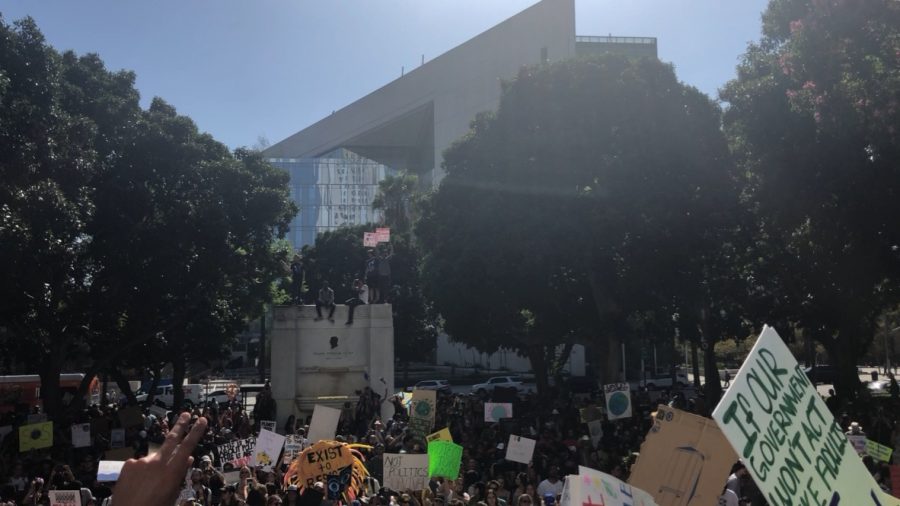Mikayla Weissberg
Voices Editor
The sun burned my shoulders as I stood on the steps of city hall, leaning over the shaky barrier separating me from a line of armed policemen. I was surrounded by around 15,000 other teenagers, my throat was parched and my head pounded, but the hot air was buzzing with a tension and energy that can only be described as life-or-death. Handmade cardboard signs bearing enraged messages raised above the crowd. On top of the steps, I screamed at the top of my lungs, my voice breaking as I led chant after chant begging some higher power, some old white man sitting in his D.C. office, to listen to our cries and protect our futures.
On Friday, September 20th, 2019, millions of people around the world left their schools and jobs to gather in protest of the lack of action against climate change. This movement, started by Swedish 16-year-old Greta Thunberg who left school to sit alone on the sidewalk with a meager poster, quickly gained social media attention and exploded into the record-breaking gatherings that scattered the globe in September. In sparking this climate strike movement, Thunberg has also unintentionally ignited an intergenerational warfare evolving to resemble the counterculture conflict of the 1960s.
At the Los Angeles strike, a couple dozen teenagers in orange vests were in charge of the masses, doing their best to control the enraged crowd. There was about a half hour, though, where things were completely out of control. A 14-year-old boy jumped the barrier, racing up the steps and towards the line of policemen. He didn’t say a word, but just stood in front of them, smiling defiantly. After a moment, a couple others joined him, and soon the crowd was rushing over the barriers as if they were made of straw, crowding the floor and climbing atop lamps and walls to get a better view. They weren’t inciting violence but trying to express their frustration at the police and mayor for not taking action on an issue that they felt was vital to their futures. After an extensive wait, the mayor finally came out of town hall. He was greeted, though, not by the cheers he was clearly expecting, but by a roar of boos.
Generation Z has been labelled by its predecessors as jaded, ungrateful, and incessantly attached to their mobile devices. Older generations have stigmatized us as chronically privileged since we were born, disregarding our opinions before we were old enough to express them. Growing up, these predispositions had a significant effect on my ability to express my own opinions. I felt that my ideas were somehow unworthy or inadequate because I couldn’t remember Kennedy’s assassination or the Vietnam War.
Social media, interestingly enough, has been the hub of Gen Z activism. Thousands of Instagram and Twitter accounts run by teenagers are dedicated solely to social justice and politics. The very devices that older generations have dismissed as killing our brain cells have become the fuel for worldwide movements like the climate strike. Inside the “privacy” of social media, teens have fostered in each other a sort of hatred towards other generations and toward authority. Recently, the phrase “OK Boomer” has taken over social media, initially a response to a video of an older man expressing the all-too-familiar disdain against our generation. We have tried to express our opinions, whether it be on climate change, prison reform, or police brutality, through facts, through graphs, and through statistics, but have been endlessly dismissed by other generations. “OK Boomer” is a way of expressing this wholehearted frustration, almost a surrender of explaining the issues we feel are important.
“OK Boomer” has ironically gained more traction than almost any other, much more well-thought out, Gen Z protest. Older generations are furious that we would silence them, dismiss their opinions, degrade them to a simple, final four syllables. How can we disregard them so openly? How rude it is that we won’t even listen to the advice they have to give us, the ideas they have for us to take on and change the world when it is our time.
To that, I say, how does it feel?



